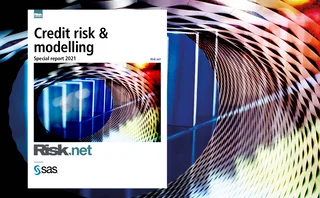
Confidence building

The credit crisis continues to throw up big surprises. Just when it looks as if things are beginning to calm down, there's yet another bombshell - whether it be larger than expected writedowns at investment banks, the near-collapse of the monoline sector or the fraud at Société Générale - causing investors and dealers to retreat, liquidity to evaporate and interbank lending rates to spike.
The most recent bombshell was the near-collapse of Bear Stearns. Rumours that Bear was facing liquidity problems swept the market in early March, prompting the firm to declare on March 10 that there was "absolutely no truth to the rumours of liquidity problems".
Nonetheless, the rumours persisted, and with concerns about its mortgage exposures becoming more acute, counterparties simultaneously pulled credit lines, triggering emergency support from the US Federal Reserve on March 14 and its subsequent acquisition by JP Morgan.
As well as once again highlighting the dangers of liquidity risk, the Bear situation has pushed counterparty credit risk up the risk management agenda. Bear was a top dealer in the credit default swap (CDS) market and, as such, was considered relatively safe as a counterparty. While most participants tend to use collateral to manage counterparty risk exposure, the collapse of a major dealer would have caused havoc as counterparties rushed to liquidate the collateral they held against those positions and to replace the trades they had on with Bear.
Meanwhile, the crisis has brought to light the fact that, in some instances, little attention was given to correlations between the counterparty and the reference entity. Banks have reported billions of dollars in writedowns after buying protection on super-senior tranches of CDOs of ABSs from monoline insurers. Far from providing gold-plated insurance on these super-senior tranches, the sharp widening of monoline spreads has meant dealers have faced mushrooming exposure to their monoline counterparties, at precisely the time the hedge is most needed.
In response to this new-found appreciation of counterparty credit risk, and the concern that the market may grind to a halt in the event of default of a major CDS trader, a number of credit derivatives dealers are working to set up a clearing house for the over-the-counter credit derivatives market. The initiative is being developed in conjunction with the Clearing Corporation, and will initially be open to credit derivatives indexes.
The proposal has met with mixed responses. Some say they are sceptical, noting previous attempts over the past 20 years to create a central clearing house for the OTC market have come to nothing. Others point to the success of some exchanges in creating clearing services for a limited number of OTC instruments.
This initiative isn't going to solve all the market's problems. But, if nothing else, it might help restore confidence in the market.
- Nick Sawyer, Editor.
Only users who have a paid subscription or are part of a corporate subscription are able to print or copy content.
To access these options, along with all other subscription benefits, please contact info@risk.net or view our subscription options here: http://subscriptions.risk.net/subscribe
You are currently unable to print this content. Please contact info@risk.net to find out more.
You are currently unable to copy this content. Please contact info@risk.net to find out more.
Copyright Infopro Digital Limited. All rights reserved.
As outlined in our terms and conditions, https://www.infopro-digital.com/terms-and-conditions/subscriptions/ (point 2.4), printing is limited to a single copy.
If you would like to purchase additional rights please email info@risk.net
Copyright Infopro Digital Limited. All rights reserved.
You may share this content using our article tools. As outlined in our terms and conditions, https://www.infopro-digital.com/terms-and-conditions/subscriptions/ (clause 2.4), an Authorised User may only make one copy of the materials for their own personal use. You must also comply with the restrictions in clause 2.5.
If you would like to purchase additional rights please email info@risk.net
More on Credit risk
US bank CROs see only ‘modest’ credit risk from tariffs
Risk Live North America: Lower margins are early sign of stress, but Ally, Citizens and Pinnacle confident on loan books
Credit risk management solutions 2024: market update and vendor landscape
A Chartis report outlining the view of the market and vendor landscape for credit risk management solutions in the trading and banking books
Finding the investment management ‘one analytics view’
This paper outlines the benefits accruing to buy-side practitioners on the back of generating a single analytics view of their risk and performance metrics across funds, regions and asset classes
Revolutionising liquidity management: harnessing operational intelligence for real‑time insights and risk mitigation
Pierre Gaudin, head of business development at ActiveViam, explains the importance of fast, in-memory data analysis functions in allowing firms to consistently provide senior decision-makers with actionable insights
Sec-lending haircuts and indemnification pricing
A pricing method for borrowed securities that includes haircut and indemnification is introduced
XVAs and counterparty credit risk for energy markets: addressing the challenges and unravelling complexity
In this webinar, a panel of quantitative researchers and risk practitioners from banks, energy firms and a software vendor discuss practical challenges in the modelling and risk management of XVAs and CCR in the energy markets, and how to overcome them.
Credit risk & modelling – Special report 2021
This Risk special report provides an insight on the challenges facing banks in measuring and mitigating credit risk in the current environment, and the strategies they are deploying to adapt to a more stringent regulatory approach.
The wild world of credit models
The Covid-19 pandemic has induced a kind of schizophrenia in loan-loss models. When the pandemic hit, banks overprovisioned for credit losses on the assumption that the economy would head south. But when government stimulus packages put wads of cash in…







